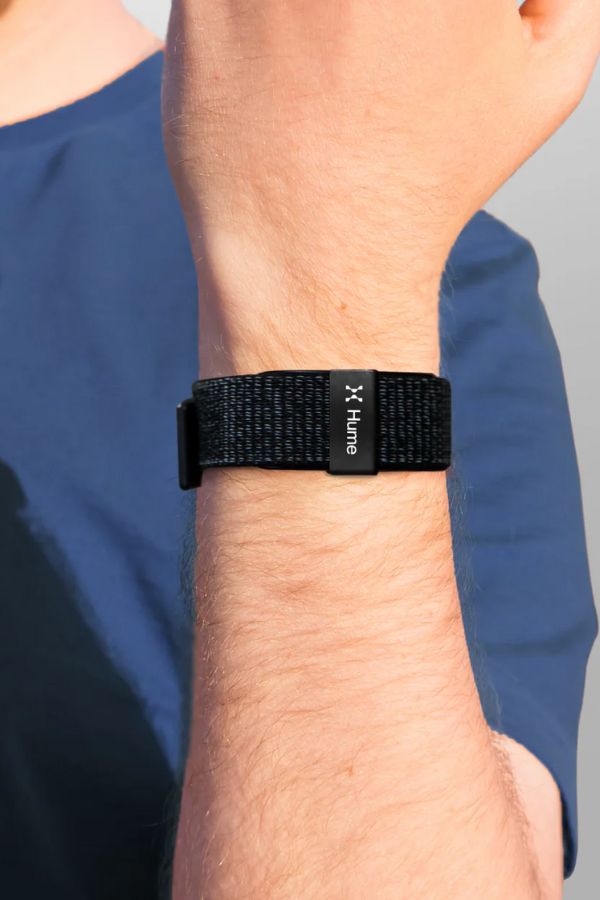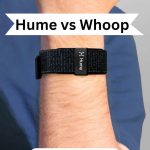Hume Band Review: The Best New Health Tracker? Hume vs Whoop?
When it comes to advanced health wearables, the Whoop Strap and the Hume Band take a unique approach. Both are screenless bands packed with sensors and analytics, yet they target different goals. Whoop is well-established among athletes for its focus on daily training load and recovery, while Hume is a newcomer aiming to “future-proof your health” by tracking longevity and metabolic fitness. In this comparison of hume vs whoop, l examine all major features side by side; from sleep and recovery to workouts, stress monitoring, battery life, app experience, comfort, integrations, pricing, and more.
I've worn the Hume Band for about two months now. When it comes to health wearables, I've tried a lot of them! Fitbit, Garmin, Samsung watch and I'm a long term user of the Oura ring. If you already use a different wearable, you may wonder if you need a a Hume Band. Each different wearable is more suited to recovery, general fitness, performance or sleep.
Hume Band Review
Where the Hume Band really shines is in the recovery and performance departments. While it's great for athletes, the Hume Band really caters to those of us who are interested in improving our overall health and longevity rather than just sports performance. It has unique features that show how certain behaviors affect your longevity over time and it can be very motivating to see you biological age going down as you implement new healthy habits. And, it still has all the features that give you insight into recovery and readiness for sports performance. If you decide you love the Hume Band like I do, follow the link and use code HEALNOURISHGROW at checkout to save 30 percent!
Disclaimer: Links may contain affiliate links, which means we may get paid a commission at no additional cost to you if you purchase through this page. Read our full disclosure here.
Feature Comparison Hume vs Whoop
| Feature | Hume Band | Whoop 5.0 |
|---|---|---|
| Sleep Tracking | Tracks sleep stages and quality, ties results to long-term metabolic health and resilience. | Detailed sleep stages and “Sleep Coach” recommending hours and bedtimes for optimal recovery. |
| Recovery & Readiness | Focuses on long-term resilience and Metabolic Capacity, showing whether habits are slowing or accelerating aging. | Provides a daily Recovery Score (0–100%) based on HRV, resting HR, and sleep, guiding daily training decisions. |
| Workouts & Fitness | Continuous HR, calories, and activity tracking. Strain is framed as impact on metabolic health over time. | Continuous HR, calories, VO₂ max, detailed Strain score for each workout and day. High accuracy, athlete-focused. |
| Stress Monitoring | Identifies early signs of stress, immune decline, or inflammation via HRV, resting HR, and temperature changes. | Tracks HRV and offers real-time stress scores (premium tiers). Breathwork guidance helps manage strain. |
| Battery Life | 5–7 days per charge. Fast recharge in ~30 minutes. | 12–14 days per charge. On-wrist charging with battery pack (higher-tier plans). |
| App Experience | Simple, modern app with weekly health scores and longevity insights. Optional AI coaching for $8.99/month. | Polished app with Sleep, Recovery, and Strain dashboards, plus community features. All data requires subscription. |
| Form Factor | Ultra-light (8.6g), minimalist, very comfortable for 24/7 wear. | Heavier (26.5g) but durable and customizable with multiple strap options. |
| Integrations | Syncs with Apple Health, Google Fit, Garmin, Fitbit. Raw data export supported. | Limited integrations. Works with Apple Health, Strava, some workout imports. No full raw data export. |
| Pricing | $299 one-time purchase. Optional Premium $8.99/mo for extra coaching. No subscription required for core data. | Subscription required: $239/year (Whoop Peak). Higher tiers $359/year (Whoop Life) for advanced features. Device included with membership. |
Sleep Tracking Capabilities

Both Whoop and Hume excel at sleep tracking but present it differently. Hume ties nightly data to long-term metabolic resilience, while Whoop integrates sleep into daily performance readiness. Whoop’s “Sleep Coach” is especially helpful for athletes needing to optimize recovery before big training sessions or competitions, while Hume helps users see how consistent rest impacts longevity and overall health.
Recovery and Readiness Metrics
Whoop offers a clear daily Recovery Score, ideal for athletes deciding whether to push or rest. Hume provides a Metabolic Capacity score, emphasizing long-term resilience. This makes Hume better suited for those concerned with preventing burnout or aging-related decline, while Whoop caters to daily sports training optimization.
Workout and Fitness Tracking
Whoop has the edge for performance athletes with its precise strain metric, heart rate accuracy, and VO₂ max estimates. Hume tracks workouts too, but frames them in terms of their contribution to health span and metabolic fitness. For casual exercisers or longevity-focused users, Hume provides enough context and insight without overwhelming detail.
Stress and Mental Health Monitoring
Hume monitors stress by detecting subtle biometric changes and warning users of possible overtraining, illness, or immune decline. Whoop offers real-time stress scores (in premium tiers) and breathwork tools, making it more useful for active stress management. Both help users identify the impact of lifestyle factors on recovery and mental well-being.
Battery Life and Charging
Whoop leads with 12–14 days of battery per charge, while Hume lasts 5–7 days. However, Hume recharges in just 30 minutes, compared to ~2 hours for Whoop. Whoop’s on-wrist charging pack (included in higher plans) is convenient, but Hume’s fast charge makes downtime minimal. After mostly wearing watches for these types of insights in the past, I found the charge on the Hume Band to be more than adequate. Fitness watches often need charging daily. At around a week, I really don't think battery life should be a consideration at all when deciding between Hume vs Whoop.
App Interface and Insights
The Whoop app is polished, data-rich, and community-driven — but requires an ongoing subscription. The Hume app is clean and simple, with weekly scores and clear longevity insights. Importantly, Hume does not lock core data behind a paywall, while Whoop does.
Form Factor and Comfort
At just 8.6 grams, Hume is one of the lightest wearables on the market, making it exceptionally comfortable for 24/7 wear. Whoop is bulkier at 26.5 grams but offers greater durability, band customization, and even clothing integration for alternative wearing options.
Compatibility and Integrations
Hume supports Apple Health, Google Fit, Garmin, and Fitbit, plus raw data exports. Whoop integrates mainly with Apple Health and Strava. Hume is the more open system, while Whoop encourages use within its own app ecosystem.
Pricing and Subscription
This is the most significant difference. Hume Band costs $356 one time (or just $211.82 with my discount as of September 2025), with no required subscription. You own the device and your insights forever. An optional Premium plan is available at $8.99/month for advanced AI coaching.
Whoop requires an active membership. The Whoop Peak plan is $239 per year, while Whoop Life is $359 per year. They also have a very basic level which is $199 a eyar, about the same cost as the Hume Band alone! Without the subscription, the device is unusable. Over several years, Whoop becomes a much higher ongoing investment.
Unique Differentiators
- Hume Band: Focus on longevity, metabolic capacity, no required subscription, extremely lightweight, integration with Hume Body Pod for body composition tracking.
- Whoop: Proven daily strain/recovery system, community and team challenges, polished app, wearable charging pack, and athlete validation in professional sports.
Hume vs Whoop: Which Should You Choose?
Both Whoop and Hume are excellent devices but serve different priorities:
- Choose Whoop if you are an athlete or performance-driven individual who values daily strain and recovery optimization, and don’t mind the costly yearly subscription.
- Choose Hume Band if you are health-conscious, longevity-focused, prefer to avoid ongoing costs, and want a simpler, more comfortable tracker that ties habits to long-term resilience.
For buyers, the decision ultimately comes down to daily performance vs. long-term healthspan. Whoop remains a more known tracker having been in the market longer, while the Hume Band is the emerging leader for those who want actionable athletic performance and longevity insights without subscriptions.


